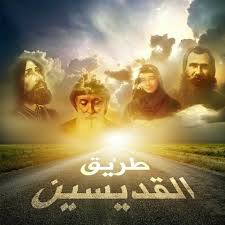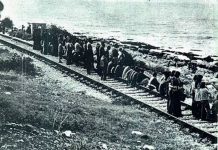السفير البرتو فرنانديز من موقع ميمري: لبنان المعقل المسيحي الأخير في المشرق يكافح من أجل البقاء
07 تموز/2025

Asia is the most populated of continents but the one with the smallest percentage of Christians. There are, of course, more than two hundred million Asian Christians, stretching from the Middle East to the Far East. Two Asian countries are majority Christian – Timor-Leste and the Philippines. Flores island in Indonesia is majority Catholic and three of India’s 28 states – Nagaland, Mizoram, and Meghalaya – are majority Christian. All of these communities are the result of Western missionary activity, from the 16th to 20th century from Catholic Portugal and Spain and from Anglo-American Protestants.
A Mountain Refuge
But there is another living Christian enclave, the only one of any size in West Asia, one with a much more ancient history than that of these other Christian regions. It runs from the Mediterranean Coast at Koura to the mountain town of Bsharri then down to the city of Zahleh and West to East Beirut. This is a Christian heartland inside the Republic of Lebanon. While Christians are about 37 percent of Lebanon’s population, they are an overwhelming majority within these confines. Most of the people in this zone are Maronite Catholics, with important populations of Greek Orthodox and Melkite Catholics, among other Christian denominations.
This region is similar to but larger than the zone ruled by Christian militias during the Lebanese Civil War (1975-1990), a region that was sometimes called the East Beirut canton or, sarcastically, “Marounistan.” Today Christian Lebanon, like all of Lebanon, is in deep crisis but the economic and political pressures striking at almost all Lebanese hit hard among its usually middle-class Christian population, threatening the survival of a distinctive, now unique, community.
This enclave has, through the centuries, shifted north or south, grown, and shrunk in response to the attacks or support by outside powers. We know that the “Maronite nation,” celebrated as archers, welcomed the Crusaders in the 11th century as they marched down the Lebanese Coast on the road to Jerusalem. The same Maronites would centuries later be driven deep into the highest and most isolated mountain regions of Lebanon by the triumphant Muslim Mamluks in the 13th and 14th centuries. They would endure massacres in the 19th century and a genocidal famine in the early 20th century and yet remain. And centuries before there was a Lebanese Republic there was an existing political reality on Mount Lebanon, made up mostly of Druze and Maronites.
There was a time when there were other well-known Christian majority regions in West Asia, the Syrian Orthodox Tur Abdin region of Southern Anatolia was one of them. But war, turmoil, and persecution has largely emptied these regions of their Christians decades ago, as has happened or is happening more recently in Iraq, Syria, and the Holy Land. In relative terms, the Christian majority part of Lebanon remains intact, for now.

It is like the rest of Lebanon, but different. Here you see street shrines to Our Lady or to Saint Charbel, numerous churches and monasteries, monuments to Christian Resistance fighters against invading Palestinians and Syrians. Hillsides are often terraced with olive and fruit trees. Well-kept, mostly middle-class towns and villages in the mountains and hills give way to the urban sprawl and terrible traffic of the Lebanese Coast and of Greater Beirut. The congestion and pollution in “Christian” Jounieh and “Muslim” Hamra or Dahiya are the same.
A Permanent Crisis
Fifty years after the beginning of the Lebanese Civil War, the Christian existence – or perhaps, Christian independent decision-making or autonomy are better descriptions – is threatened as never before. This is largely the result of two crises: the Lebanese economic collapse triggered by the liquidity crisis of 2019 and the political crisis triggered by the stranglehold of the so-called “Shia duopoly” (Hezbollah plus its ally in Nabih Berri’s Amal party) has on government decision-making and finances.
The result of the Shia duopoly, supported by Iranian cash, has been to make a corrupt and dysfunctional system even more corrupt and dysfunctional. They make the possibility of internal reform less likely while preying on ailing government coffers like parasites and using the threat of violence against internal enemies and as a strategic tool to use to plunge Lebanon into war once again at the time of their own choosing. Hezbollah is reportedly deeply implicated in the assassination of both Muslims and Christians, such as Lokman Slim in 2021 and Elias Hasrouni in 2023. Under the current political system, Christians (and Druze and Sunni Muslims) are shackled to the whims of the Amal-Hezbollah alliance.
The economic crisis brought about the devaluation of the Lebanese currency by 98 percent. Inflation reached 45.23 percent in 2024 while official unemployment remains over 11 percent. The World Bank described Lebanon’s “deliberate depression” as one of the most severe economic collapses seen globally since the 1850s.
This collapse impacted especially Christian-dominated sectors of the Lebanese economy: banking, education, and medicine. Salaries and employment nosedived. Emigration spiked. Young Lebanese, if they hope to have a future, look to migrate, either to the thriving economies of the Gulf or to the West. If to Dubai or Kuwait, there is a likelihood that they will return to live in Lebanon at some point. If they move to Europe, America, or Australia, odds are that they will be permanently absorbed by the West.
A bishop in Melkite Catholic-majority Zahleh told me recently, “look around, there are no young people here. Either you have the old or children that are still in school and not old enough to emigrate.” Jobs in Christian towns like Zahleh or Bsharri are increasingly hard to come by, services dry up or deteriorate and locals feel compelled to move to or commute to Beirut and then look for opportunities outside of Lebanon. And Gulf Arabs know they can hire Lebanese more cheaply because of the dire economic situation back home.

Steadfastness Against All Odds
Against this grim scenario, Lebanese Christians fight back, trying to remain in their ancestral homeland. Knowing the economic disaster the country has endured and still endures, it was heartening for me to recently see so many grass roots efforts towards steadfastness and resilience. In Bsharri, the Comité des Amis de la Forêt des Cèdres has planted 220,000 new cedar trees over the past 20 years.
The celebrated ancient preserve of the Cedars of the Lord nearby, a tiny remnant of the old-growth cedar forests mentioned in the Bible that used to cover the mountains in antiquity, is literally on church land. For centuries, the Maronite Patriarchs would lead a procession from their monastery in the nearby Holy Valley to the Cedars on the Feast of the Transfiguration of the Lord.
The Lebanese Maronite Order has also been a pioneer through its “Adyar” (Arabic for “monasteries”) organic wine label and organic agriculture in general. Of course, monks have been making wine in Lebanon for centuries. This latest initiative dates only from 2001 and markets wine from eight different monasteries.
Attending the Commencement ceremony at the Holy Spirit University of Kaslik (founded in 1950 by the Lebanese Maronite Order), I was struck not only by the enthusiastic graduates (new university graduates are almost always enthusiastic) but by the relatively young and very accomplished faculty. USEK has over 7,000 students, almost all of them Christians.
In his stirring remarks at the graduation, USEK President Fr. Talal Hachem lauded the students for persevering during harsh economic conditions and urged them to be constant in their Catholic faith. The fear is that many of these energetic new doctors and engineers will find no place in their own country – no good job or opportunities to put down roots or start a family. All Lebanese Christian educational institutions face a grim dilemma – families which cannot or struggle to pay tuition which means that the institutions struggle to pay Christian teachers a living wage.
The Church not only has preserved the cedars (it is still a major landowner in the country), makes wine and educates future generations, but also evangelizes. Charity Radio TV in Jounieh, run by a dynamic young priest, Father Charbel Geagea, not only provides news, music, and inspiration in Arabic – essential given how long Lebanese are stuck in traffic – but also provides spiritual services to Ethiopian and Sri Lankan guest workers in their own languages.
The large Lebanese Christian diaspora has done much to help. A major donor to the Cedars reforestation project is from Mexico. But most of the international help has focused, understandably so, on immediate emergency needs: food parcels, medicine, and support for the elderly. There is an urgent need to focus on job creation and income generation.
One worthy initiative would involve that most Maronite of fruits, the apple. Most apple orchards in Lebanon are in the Christian – Maronite – highlands and growers compete with Turkey (and the West) to provide apples to the lucrative Gulf market. Growers in Bsharri today face the challenge of changing tastes – Red Delicious are out of fashion, Gala varieties are more commercially desirable. International donors could subsidize the cost of switching to the more desirable, valuable varieties and of the transition period needed for these new apple trees to reach maturity.
One local agronomist told me of some Islamists in the region refusing the Lebanese apple “because it puts money into the pockets of the Christians,” preferring the Turkish apple. Local credit and government support are practically non-existent. Help must come from the outside. Something as mundane as supporting apple growers in Lebanon can prevent demographic change on the ground.
Near Fatal Attachments
While Lebanese are often creative and wildly successful (especially outside of Lebanon), inside their country, they are often plagued by a frequently predatory or short-sighted ruling class. As one Lebanese academic told me, “even the better ones are mercantile and not strategic, thinking of short-term gain and not long-term benefit.” This is often true no matter the religious confession.

And yet it was Christian government officials that, disastrously, allowed Palestinian armed groups to set up camp inside Lebanon in 1969. And, of course, Christian militias turned on each other during the Civil War, killing hundreds of their own people. Hezbollah (and Assad’s Syria before them) had Christian political allies, puppets that did tremendous damage as government officials. As you drive north along the coastal road, near Mseilha, you come across an empty dam. It is not old but built within the last decade, a colossal waste of money and a monument to government incompetence. A friend calls it “Gibran Bassil’s dam,” after the former Lebanese Minister Gibran Bassil, a Maronite and ally of Hezbollah. It was Bassil’s pro-Hezbollah Free Patriotic Movement that built several worthless, useless dams in Lebanon while they were in power.
In Beirut, there are neighborhoods now known as Al-Zuyatriah (Fanar) and Ruwaisat (Jdeideh), which were mostly Christian-owned farm land, rare green and rural spots inside the city. During the Lebanese Civil War, these areas were illegally settled by mostly Shia squatters from the Ja’far and Zuaiter clans who have now been there for decades.
The Christian farmers have never been compensated and the area became a safe haven for drug dealers and kidnappers including the notorious Ali Munther Zuaiter (“Abu Sella”), sentenced in 2024 to death in absentia for kidnapping a Saudi national. Lebanese justice was able to (belatedly) act when the case involved a foreign citizen. For Lebanese Christian farmers, justice never came despite the state having a Maronite president and a Maronite army commander.

An Orthodox bishop in Lebanon told me that what Christians want most is “stability and security” and the combination of deep economic crisis and arbitrary Hezbollah rule make that extremely hard to find. In his view, Lebanon is the key to the survival of Christians throughout the Levant. This is where many can still have relative breathing space, where they can publish, work, and plan in peace. If Christian Lebanon falls, it is a tragedy and a catastrophe not just for the Christians of Lebanon but for Christians everywhere and for religious pluralism and coexistence throughout the region.
Earlier this year, in front of senior government officials, the Maronite Catholic Patriarch Mar Bishara Butros al-Rai called on Lebanon to maintain a “positive neutrality” from regional conflicts and – in an affront to Hezbollah’s main narrative – to be on the side of the “axis of civilization, renaissance, and progress.” He added that Lebanon needed to stop procrastinating on government reform.
Some Lebanese Christians, calling themselves “Federalists,” wholeheartedly endorse the patriarch’s call for neutrality but also believe more radical change is needed now, “moving from the failed experience of centralized governance to federalism,” devolving powers away from a dysfunctional national government beholden to Hezbollah to several sub-state regions like the Christian-majority zone. The Federal Lebanon activists are very much influenced by the Catholic social teachings on subsidiarity and solidarity as envisioned by Pope Pius XI in the 1931 encyclical Quadragesimo Anno. While the Federalists are eloquent and thoughtful, and very active in the media, their views seem to be – so far – mostly rejected by even the main Lebanese Christian parties.
Better, transparent governance across the board would help all Lebanese. But assisting Christian communities to thrive in places like Bsharri or Zahleh or Kaslik is not about favoring one community over another but rather about ensuring the survival of a precious and all too threatened model of tolerance.
A Lebanon without a strong and lively Christian (and Druze) presence would be a sad appanage to the monochrome Sunni-Shia battlefields seen in Syria, Iraq, and beyond. You do not really have real tolerance or pluralism if the Christian population falls below a certain level, becomes powerless, and essentially turns into puppets of the Muslim majority, as we see today in all countries in the Middle East except for Lebanon. In Iraq for example, we see where Christian political representatives are elected by and beholden to Shia-bloc voters in Southern Iraq voting for an Islamist ticket that wants to capture a few more parliamentary seats that were supposedly set aside for minority representation.
Tangibly providing the support for Lebanon’s Christians to stay rooted in their communities by helping their institutions – schools, universities, media, farmers, small business – survive and flourish is one of the essential paths in securing this aim of a distinctive and unique Lebanon. It is an essential part of Lebanon remaining Lebanon and not being submerged and ultimately drowned in regional conflicts.
*Alberto M. Fernandez is Vice President of MEMRI.























